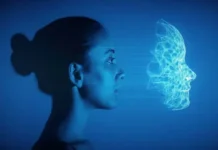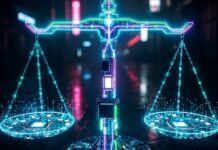Artificial intelligence continues to generate creative works ranging from art and music to complex research papers. However, questions surrounding the ownership of AI-generated content escalate into heated legal and policy debates.
The rapid adoption of generative AI tools like ChatGPT, DALL-E, and others has far outpaced necessary guidelines and regulations. Governments, industries, and legal experts grapple with balancing innovation with intellectual property (IP) protections.
Key Takeaways
- The ownership of AI-generated content raises significant legal questions as existing copyright laws require human authorship.
- Creators like artists and authors face challenges, with lawsuits emerging against AI developers for unauthorized use of their works.
- Governments propose regulations like the EU’s AI Act to address the complexities of AI-generated content ownership.
- Ethical concerns arise regarding the impact of denying copyright on innovation and the power balance in creative industries.
- The future of AI-generated content ownership remains uncertain, needing collaboration among lawmakers, tech companies, and creators.
Table of Contents
The Current Landscape of Ownership
At the core of the debate is the question: Who, if anyone, owns the output of AI systems? Under existing intellectual property laws in many jurisdictions, works must be attributed to a human author to qualify for copyright protection. However, AI-generated content, which is created with minimal or no direct human intervention, challenges these traditional frameworks.
In the United States, the U.S. Copyright Office (USCO) has denied registrations for fully AI-generated works, asserting that human authorship is a prerequisite for protection. Use of AI to create work is not an absolute bar for copyright. If the AI software merely assists, then the result might be protectable, according to the USCO in 2023. Similarly, courts in other countries, including the United Kingdom and Australia, upheld that copyright does not extend to non-human creators. Despite this, businesses that utilize generative AI explore alternative protections, such as trade secrets and contractual agreements.
Emerging Legal Challenges of AI-Generated Content
The ownership debate has led to a slew of lawsuits and policy proposals. High-profile cases include authors and artists suing AI developers for using their works as training data without consent. In one instance, a group of visual artists initiated a lawsuit against Stability AI and other platforms for copyright infringement. They claimed their copyrighted works were used without authorization to train AI models. Sarah Anderson, a popular internet cartoonist, noted in 2022 that an AI image generator, Stable Diffusion, used her images. AI recreated her popular comics using her copyrighted elements. She and many other artists filed a class-action copyright infringement lawsuit against Stability, Midjourney, and DeviantArt. The judge in the initial judgment agreed that distributing the AI product is the same as distributing copyrighted works. It remains to be seen how the next stage will address this claim.
In response, some AI companies argue that their use of training data falls under “fair use” doctrines. The data is transformed and utilized to develop novel applications, they allege. These cases are setting critical precedents for how AI-generated content and its foundational data are treated under the law.
Authors and artists should hire an attorney experienced in AI law to enforce copyright claims, negotiate licensing agreements, and assess whether their work has been unlawfully used in training datasets. AI developers should seek legal counsel to ensure compliance with intellectual property laws, structure fair use defenses, and mitigate litigation risk.
Policy Makers Step In
Governments step into the fray with greater frequency, proposing new policies to address the unique challenges posed by AI-generated works. The European Union’s AI Act is one of the most comprehensive regulatory frameworks to date. The AI Act includes provisions requiring transparency and accountability for generative AI systems. Meanwhile, in the U.S., lawmakers are debating whether AI systems should be treated as tools, with ownership assigned to the user, or as autonomous entities with no legal claim to their creations.
Some countries, such as Japan, take a more permissive approach. For example, Japan allows broader use of copyrighted material for AI training under exceptions designed to foster innovation. Conversely, China has introduced stringent regulations mandating disclosure of AI-generated content to prevent misuse and ensure accountability.
The Ethical Dimension of AI-Generated Content
Beyond legal questions, the ownership debate raises ethical concerns. Critics argue that denying copyright to AI-generated works could disincentivize creators and companies from investing in AI technologies. Conversely, granting ownership rights to AI developers or users could exacerbate power imbalances, with large tech firms amassing disproportionate control over creative industries.
Experts also warn of the broader societal implications. “If AI systems become the primary creators of new content, we risk devaluing human creativity and its unique cultural contributions,” says Dr. Emily Carter, a digital ethics scholar. Balancing these competing interests will require careful consideration and collaboration between lawmakers, tech companies, and creative communities.
In a December 2024 article by Ohio.edu, Dr. Chad Mourning explains that currently, much more energy is being put forth toward the generation than the detection of images created by AI. However, a technique known as Generative Adversarial Networks (GANs) effectively asks AI to detect AI images. The generator can discriminate images to pull out the ones that appear as if created by AI. Clearly, with this technology, ethical guidelines must be in place to protect individuals and their original content.
Dr. Paul Shovlin, a specialist in AI and Digital Rhetorics, suggests that the responsible application of AI rests in each person who uses it. He suggests asking yourself, “What would my audience think if they knew I was generating this text with AI?”
The Road Ahead
As AI technologies transform, the debate over ownership is unlikely to settle soon. Courts, policymakers, and industry leaders work to craft frameworks that foster innovation while protecting the rights of creators and the public interest. For now, the question of who truly owns AI-generated content remains unresolved, signaling a transformative period for intellectual property law and the creative landscape.











